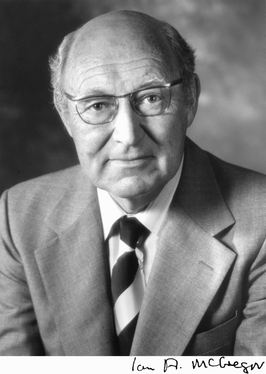Related Research Articles

Hazel Katherine Stiebeling (1896–1989) was an American nutritionist who pioneered the development of USDA programs for nutrition including USDA daily dietary allowances of vitamins and minerals.

Elsie Widdowson, was a British dietitian and nutritionist. She and Dr Robert McCance, a pediatrician, physiologist, biochemist, and nutritionist, were responsible for overseeing the government-mandated addition of vitamins to food and wartime rationing in Britain during World War II.

Robert Alexander McCance, CBE, FRS was a British paediatrician, physiologist, biochemist and nutritionist and was the first Professor of Experimental Medicine at the University of Cambridge.
Veronica van Heyningen is an English geneticist who specialises in the etiology of anophthalmia as an honorary professor at University College London (UCL). She previously served as head of medical genetics at the MRC Human Genetics Unit in Edinburgh and the president of The Genetics Society. In 2014 she became president of the Galton Institute. As of 2019 she chairs the diversity committee of the Royal Society, previously chaired by Uta Frith.

Mary Rita Cooke Greenwood is a nationally recognized leader in higher education, nutrition, and health sciences. Additionally, her research has been extensively published, internationally recognized, and has earned awards.

MRC Human Nutrition Research was the largest research institute in the UK for human nutrition, and was based in Cambridge.
Muriel Emma Bell was a New Zealand nutritionist and medical researcher.

Sir Stephen Patrick O'Rahilly is an Irish-British physician and scientist known for his research into the molecular pathogenesis of human obesity, insulin resistance and related metabolic and endocrine disorders.

May Mellanby, néeTweedy was an English medical researcher, styled Lady Mellanby after her husband, Edward Mellanby, was knighted in 1937. As well as nutrition research carried out with her husband, she conducted independent research into the physiology of dentition and the causes of dental disease. She recommended a diet high in Vitamin D and low in cereals to help teeth protect themselves against decay.
Anthony Seaton qualified in medicine from Cambridge University in 1962, and after training in Liverpool was appointed assistant professor of medicine at the University of West Virginia, USA in 1969. He became consulting chest physician at the University of Wales in 1971, and was named director of the Institute of Occupational Medicine at Edinburgh in 1978. Seaton became the head of the Department of Environmental and Occupational Medicine at the University of Aberdeen in 1988 and on retiring in 2003 became emeritus professor. He continues to write and teach and has active research interests in the causes of asthma and occupational illness.
Ann Jacqueline Hunter CBE FMedSci FBPharmacolS FRSB is a British scientist who is a board director of BenevolentAI. Hunter is also a visiting professor at St George's Hospital Medical School and Imperial College. She is Chair of the Trustees of the Sainsbury Laboratories at Norwich, chair of the board of the Stevenage Bioscience Catalyst and chair of the board of Brainomix. She was previously CEO of the Biotechnology and Biological Sciences Research Council.

Katherine L. Ogilvie Musgrave was an American academic, registered dietitian, and nutritional consultant. She taught food science and nutrition at the University of Maine from 1969 to 1986, and after her official retirement continued teaching for close to three decades on the university's online continuing education website, educating thousands of students. During this time she also worked as a dietitian for three Bangor physicians, conducted nutrition workshops and corporate wellness programs across the state, and appeared on a weekly radio show speaking about healthy living.

Anne Jacqueline Ridley is professor of Cell Biology and Head of School for Cellular and Molecular Medicine at the University of Bristol. She was previously a professor at King's College London.

Sir Ian Alexander McGregor, was a Scottish malariologist.
James Scott FRCP, FIBiol, FMedSci, FRS is a British cardiologist.

Irene Mary Carmel Tracey is Vice-Chancellor of the University of Oxford and former Warden of Merton College, Oxford. She is also Professor of Anaesthetic Neuroscience in the Nuffield Department of Clinical Neurosciences and formerly Pro-Vice-Chancellor at the University of Oxford. She is a co-founder of the Oxford Centre for Functional Magnetic Resonance Imaging of the Brain (FMRIB), now the Wellcome Centre for Integrative Neuroimaging. Her team’s research is focused on the neuroscience of pain, specifically pain perception and analgesia as well as how anaesthetics produce altered states of consciousness. Her team uses multidisciplinary approaches including neuroimaging.
Elizabeth Mary Claire Fisher is a British geneticist and Professor at University College London. Her research investigates the degeneration of motor neurons during amyotrophic lateral sclerosis and Alzheimer's disease triggered by Down syndrome.
The Rank Prizes comprise the Rank Prize for Optoelectronics and the Rank Prize for Nutrition. The prizes recognise, reward and encourage researchers working in the respective fields of optoelectronics and nutrition.

Fiona Hamilton Marshall is a British pharmacologist, founder and Senior Vice President of Discovery, Preclinical & Translational Medicine at Merck & Co. She will become the next president of the Novartis Institutes for BioMedical Research. She previously served as Chief Scientific Officer at Heptares Therapeutic, where she was Vice President of the Japanese biopharmaceutical company Sosei. She was elected Fellow of the Academy of Medical Sciences in 2016 and the Royal Society in 2021.
Kathleen Maher Rasmussen is an American nutritionist. She is the Nancy Schlegel Meinig Professor of Maternal and Child Nutrition in the Division of Nutritional Sciences at Cornell University. Rasmussen studies the relationship between maternal nutrition and short- and long-term health outcomes for women and their children.
References
- 1 2 3 4 5 Stefania Crowther; Lois Reynolds; Tilli Tansey, eds. (2009). The Resurgence of Breastfeeding, 1975-2000. Wellcome Witnesses to Contemporary Medicine. London: History of Modern Biomedicine Research Group. ISBN 978-0-85484-119-6. Wikidata Q29581763.
- ↑ "No. 64269". The London Gazette (Supplement). 30 December 2023. p. N11.
- 1 2 3 "Dr Ann Prentice". Cambridge University. Archived from the original on 30 August 2018. Retrieved 30 June 2017.
- ↑ "Widdowson Award winner announced - Professor Ann Prentice | The Nutrition Society". www.nutritionsociety.org. Retrieved 27 December 2020.